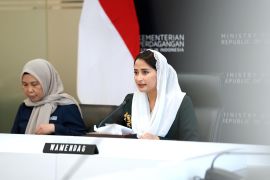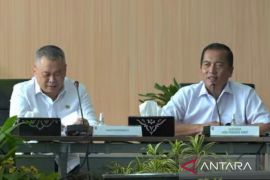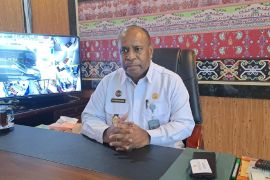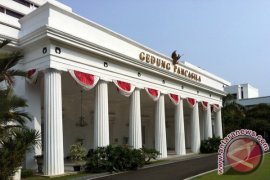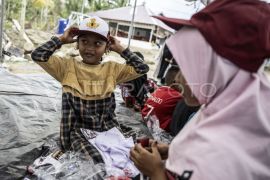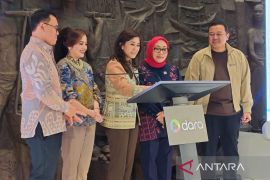President Yudhoyono had stated that global prosperity can only be attained if economy grows with equity, and in the long-run, the global economy must continue to grow in a strong, balanced, inclusive, and sustainable way.Jakarta (ANTARA News) - To the surprise of many people, poverty problem is now found not only in least-developed countries, but also in middle-income economies, and even social inequality has started to haunt developed countries.
President Susilo Bambang Yudhoyono when speaking in a cabinet meeting on economic issues in Jakarta recently warned that in countries having a high economic growth, usually the gap between the haves and the have nots is widening.
Therefore, economic growth should have a proper plan of action to help address the social inequality, he said after attending a presentation by the National Economic Committee (KEN) which focused among other things on addressing poverty and the social inequality.
As the president of a growing economic nation and a co-chair of a High-Level Panel of Eminent Persons to develop a Post-2015 Development Agenda, President Yudhoyono has frequently promoted the need to achieve economic growth in equity.
"One thing is clear from our deliberations that our ultimate goal of the Post-2015 Development Agenda is to end world poverty, and to improve the well-being of our citizens," the president said in New York, September 2012.
On the vision for the Post-2015 Development Agenda, Indonesia believed the agenda should promote equitable development, sustainable growth with equity, and strengthened global partnership, he said.
The agenda should promote an optimal balance between economic growth, social equality and environmental sustainability, the head of state stated.
According to Coordinating Economic Minister Hatta Rajasa in 2011, Indonesia is expected to be among the 10 largest economies by 2025, with a projected GDP of up to US$4.7 trillion.
Barclays Research has predicted that Indonesia`s economy, the biggest in Southeast Asia, will expand 6.3 percent in 2013, the same pace as the year 2012`s projected growth. In 2012, it grew 6.5 percent, the fastest pace since 1996.
Indonesia`s poverty rate was recorded at 11.6 percent until September 2012, higher than the government`s target at 10.5-11.5 percent.
National Development Planning Minister Armida Alisjahbana when speaking in a working meeting which discussed economic outlook 2013 recently said the reduction of poverty rate in the country has been slow since 2010 because the poverty elimination programs were not effective.
To address the problem, the government would improve the effectiveness of the country`s poverty elimination programs in 2013 by among others enhancing work opportunities and reduce the number of unemployment, she said.
The government will also increase the provision of small holder`s credit (KUR), provide guidance on entrepreneurship and give access to information.
President Yudhoyono when opening a regional meeting on the Post-2015 Development Agenda in Bali, last year, said given the nature of poverty which is multi-faceted and triggered by many factors, poverty eradication should be a far-reaching and continuous effort.
He stated that global prosperity can only be attained if economy grows with equity, and in the long-run, the global economy must continue to grow in a strong, balanced, inclusive, and sustainable way.
According to Indonesian Foreign Affairs Minister Marty Natalegawa, as the Chair of APEC in 2013, Indonesia has intended to make concrete contributions to the establishment of a future economic architecture.
President Yudhoyono has set the theme for APEC 2013, namely "Resilient Asia Pacific, Engine of Global growth". With this theme, Indonesia will continue to promote a stronger and resilient Asia Pacific as the locomotive for world`s economic growth, the minister explained.
And among Indonesia`s priorities as the APEC Chair is to achieve "Sustainable Growth with Equity, with the focus on the SMEs, global competitiveness, financial inclusion, food security, and health," Marty said when delivering his annual statement in Jakarta, on January 4, 2013.
The World Bank Group in a discussion on the Joint Country Partnership Strategy (CPS) for Indonesia for the period 2013 -2014, in Washington DC, December 2012, pledged its support to Indonesia`s Masterplan for accelerated growth, which is pro-growth, pro-jobs, pro-poor, and pro-environment.
"Building on six decades of partnership with Indonesia, during which economic growth thrived beyond expectations and millions of people were lifted out of poverty, the World Bank Group pledges its continued support of Indonesia`s agenda of growth with equity," said Stefan Koeberle, World Bank Country Director for Indonesia, in a statement.
He described Indonesia`s agenda as "a strategy that focuses on tackling growth constraints across the archipelago and strengthening connectivity will bring jobs and educational opportunities to many more Indonesians."(*)
Reporter: Fardah
Editor: Heru Purwanto
Copyright © ANTARA 2013



